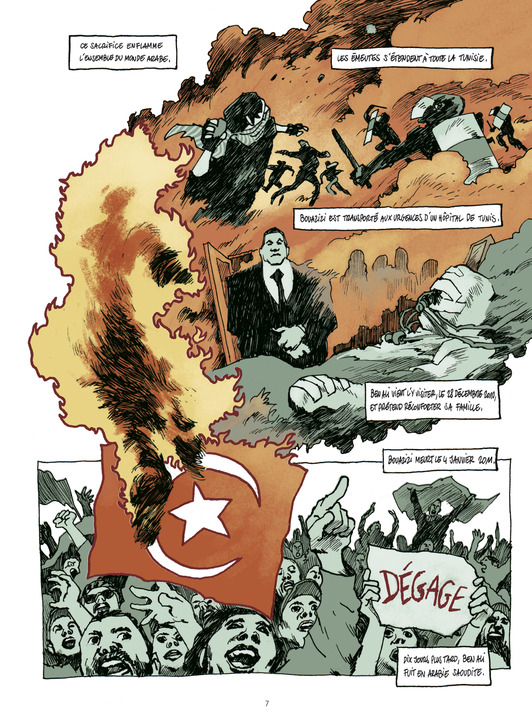Conferences and debates
Index / Activities / Conferences and debates / “Five Years of Revolution and Conflict in Syria” with Jean-Pierre Filiu
“Five Years of Revolution and Conflict in Syria” with Jean-Pierre Filiu
June 10, 20166:00 p.m.
MADRID
Activities Pavilion in the Retiro Park
6:00 p.m.
Free entry until the event’s capacity is reached.
In Spanish.
On Friday, June 10 at 6:00 p.m. in the Activities Pavilion of the Retiro Park, as part of France’s invitation as this year’s special guest at the Madrid Book Fair.
Jean-Pierre Filiu, whose works on contemporary Islam have been translated into a dozen languages, takes a different look at the revolutions in the Arab world through his comic The Arab Springs, published recently in Spain by Norma Editorial. The author invites us to put the facts and figures, deposed dictators and the role of the people in recent history into perspective once again.
Filiu insists upon his desire to express himself and to work on the cross-cutting nature of media: using comics makes it possible to surmount the difficulties of educating others. He places the focus on faces and figures (sometimes ones which are not well-known) from the Arab Springs so as to view these revolutions from another perspective, from a viewpoint other than that found in the “official” media. Likewise, The Arab Springs draws a gallery of portraits which individualize and humanize collective events.
The event will be moderated by Karim Hauser, who is responsible for the Governance Area at Casa Árabe.
Jean-Pierre Filiu, born in Paris in 1961, is a French university scholar, historian and Arabist who specializes in contemporary Islam. He is a professor at the Political Studies Institute in Paris (Sciences Po), as well as a guest professor at Columbia and Georgetown Universities in the United States.
With a diploma from the National Institute of Eastern Languages and Civilizations, he became a delegate in the International Federation for Man’s Rights in Lebanon in the middle of its civil war. In 1984, he drafted the first report on the tragedy of “disappeared” civilians in the Libyan conflict, which was presented before the UN Human Rights Commissions. Later in 1986, he took charge of a humanitarian project in one region within Afghanistan.
As a diplomat, he has been a Foreign Affairs Advisor stationed in Jordan, Syria, Tunisia and the United States. He has also been a member of the cabinets of the Minister of the Interior (1990-91), Defense (1991-1993) and Prime Minister Lionel Jospin (2000-2002).
He is a prolific, multifaceted author, whose books and analyses have been published in more than twelve languages. He has had numerous articles published on the Arab-Muslim world both in France and abroad. His works on Al Qaeda and millenarism insist upon the great divide between contemporary extremism and Islamic tradition. In the “Arab revolution” under way since the winter of 2010-2011, he sees the beginning of a long-lasting historical wave, a “second Arab renaissance” that forms part of an extension of what is known as the nineteenth-century “Nahda” (renaissance). In general, he interprets the Arab world’s recent history through the prism of “the peoples’ fight for their emancipation.”
At the same time, he has had two biographic essays published on contemporary musicians, one dedicated Jimi Hendrix (Le Gaucher magnifique), and the other to Camarón de la Isla (La Révolution du flamenco). As for his graphic novels, in addition to The Arab Springs, he has also had Los mejores enemigos (The Best Enemies, Norma Editorial), illustrated by David B., published in Spain. It deals with the relations between the United States and the Middle East. Another comic related with the conflict in Syria is La dame de Damas.
Institut Français

